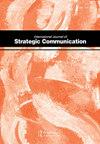Becoming a “Normal” and “Ordinary” Organization through Strategic Communication? Discursive Legitimation of the Swedish Armed Forces
IF 1.9
Q1 COMMUNICATION
International Journal of Strategic Communication
Pub Date : 2022-01-01
DOI:10.1080/1553118X.2021.2014500
引用次数: 0
Abstract
ABSTRACT This article examines the use of discursive legitimation strategies as a mode of strategic communication in public sector organizations. The study object is the Swedish Armed Forces (SAF). As a military organization, SAF’s communication has traditionally been characterized by restrictions, regulations, discretion, and secrecy. However, changing conditions have created a new need for legitimation of SAF and its operations, both internally and externally. The aim of the study is to understand how discursive legitimation is used in internal strategic communication in a public sector context, with particular emphasis on the challenges related to changing conditions and inconsistent demands on the organization. Discursive Legitimation Analysis (DLA) is used to study 31 editorials in SAF’s staff magazine to examine how SAF’s activities and its transformed role in society are legitimated. Two main findings are identified: (1) the frequent and unexpected use of rationalization as a legitimation strategy, stressing conformity with other organizations rather than differentiation; and (2) inconsistent legitimation strategies, with conflicting values and perspectives on strategic communication operating simultaneously. These findings highlight the difficulty of maintaining coherency and consistency in practice. The study further helps advancing the general understanding of the limits of strategic communication in pursuing legitimacy.通过战略沟通成为一个“正常”和“普通”的组织?论瑞典武装部队的合法性
本文探讨了话语合法化策略作为公共部门组织战略沟通模式的使用。研究对象是瑞典武装部队(SAF)。作为一个军事组织,新加坡武装部队的通信传统上具有限制、规定、谨慎和保密的特点。然而,不断变化的条件使新加坡武装部队及其行动在内部和外部都需要合法化。本研究的目的是了解话语合法化是如何在公共部门的内部战略沟通中使用的,特别强调与变化的条件和对组织的不一致的要求相关的挑战。本文运用话语正当性分析(DLA)研究了31篇新加坡武装部队员工杂志的社论,以探讨新加坡武装部队的活动及其在社会中的角色转变是如何合法化的。研究发现了两个主要发现:(1)经常和意外地使用合理化作为合法化策略,强调与其他组织的一致性而不是差异化;(2)正当化策略不一致,价值观和战略传播观点相互冲突。这些发现突出了在实践中保持连贯性和一致性的困难。该研究进一步有助于促进对战略沟通在追求合法性方面的局限性的一般理解。
本文章由计算机程序翻译,如有差异,请以英文原文为准。
求助全文
约1分钟内获得全文
求助全文
来源期刊

International Journal of Strategic Communication
Social Sciences-Sociology and Political Science
CiteScore
3.40
自引率
0.00%
发文量
39
期刊介绍:
The International Journal of Strategic Communication examines the philosophical, theoretical, and applied nature of strategic communication, which is “the purposeful use of communication by an organization to fulfill its mission.” IJSC provides a foundation for the study of strategic communication from diverse disciplines, including corporate and managerial communication, organizational communication, public relations, marketing communication, advertising, political and health communication, social marketing, international relations, public diplomacy, and other specialized communication areas. The IJSC is the singular forum for multidisciplinary inquiry of this nature.
 求助内容:
求助内容: 应助结果提醒方式:
应助结果提醒方式:


